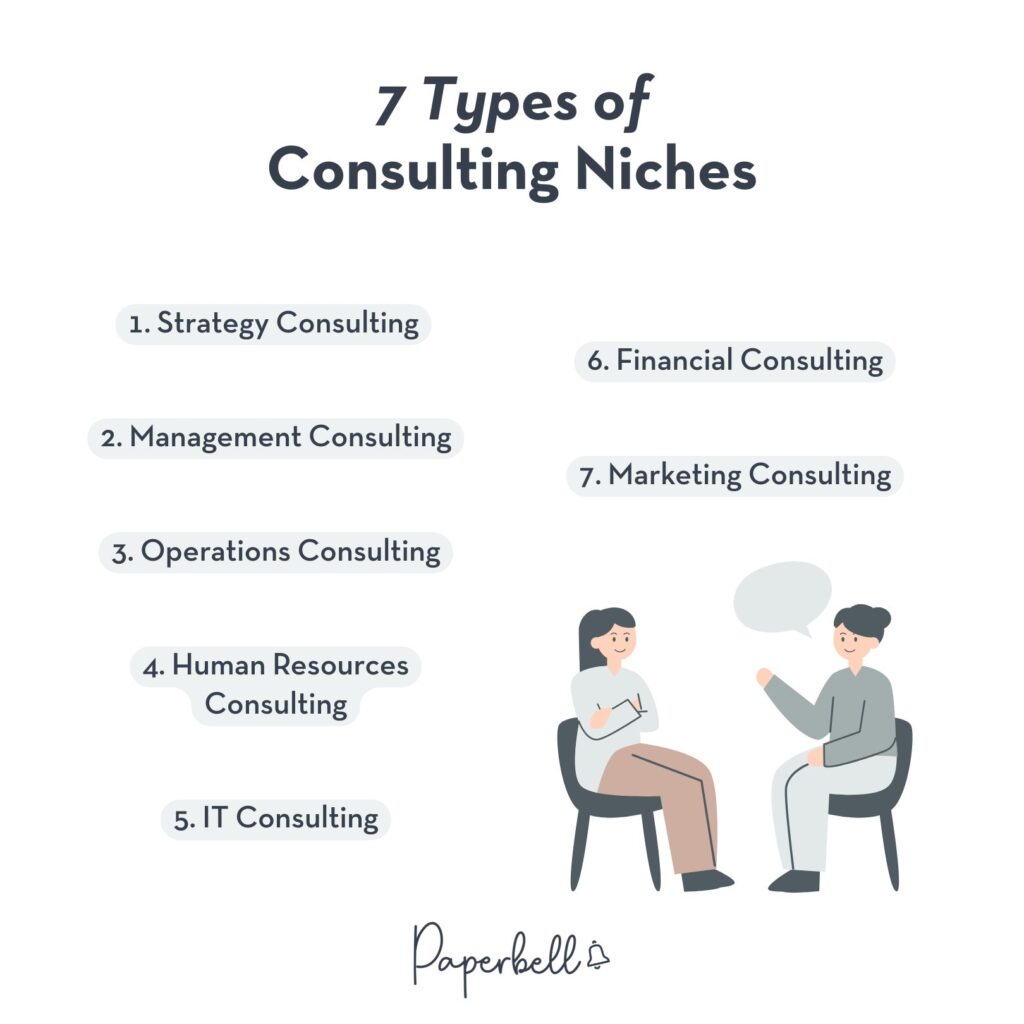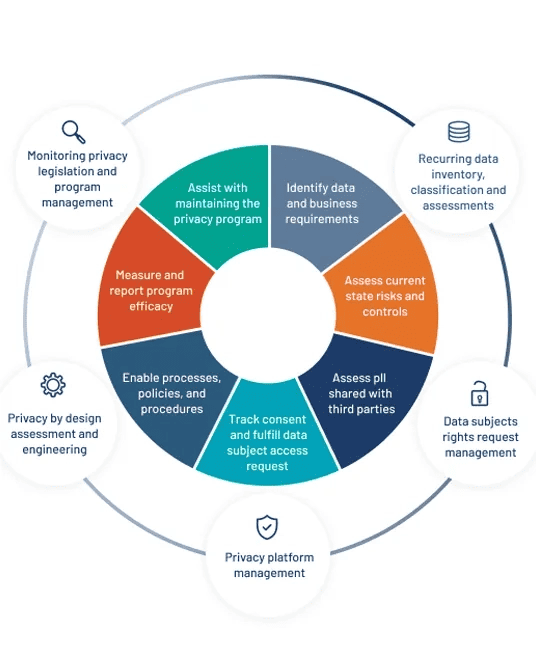Consultancy is a highly versatile field, just like the world of business itself. No single consultant is an expert at everything, so they always specialize in specific services made for a clearly defined target audience.
If you’re starting a consultancy business, you must find your niche depending on your background. The following consulting areas will give you an idea of what these specialties are.
On the other hand, if you’re looking for a consultant, this article will help you find the right expert to help you meet your objectives.
Keep reading to discover:
- What consulting is (and isn’t)
- 7 types of consulting niches
- Cross-functional consulting
- Unconventional consultancy services
What Consulting Is (and Isn’t)
Before we jump into niching down, let’s define consulting.
Consultants are experts in a particular area of business who advise their clients on subjects such as:
- Strategy
- Technology
- Operations
- Finances, and more
They typically get hired to solve specific business challenges and offer their consulting frameworks or processes.
Unlike coaches, they don’t focus on the individual as much but rather on an objective to reach or a problem to tackle in a business or project.
While coaches use coaching questions to help their clients reflect and gain insights, consultants ask questions to gather information about the present situation and propose possible solutions.
They also differ from trainers and educators who simply transmit knowledge. While consultants can teach you how to use software tools and techniques, they primarily aim to give their clients solutions and action plans and reports to solve issues as quickly as possible.
Pro tip: Consultants waste several hours each week on invoicing, contract chasing, and calendar management. Paperbell handles all of this automatically, so you can focus on delivering results for your clients.
7 Types of Consulting Niches

You might notice that there’s often an overlap between different areas of expertise in consulting. This is because these professionals, by nature, look at the correlations between business functions. They bring a high-level perspective to their clients in a particular department.
Here are some sub-niches within seven key departments you can specialize in or get certified as a consultant.
1. Types of Strategy Consulting
Strategy consultants are some of the highest-paid consultants. They can give fresh perspectives on the bird’s-eye view of a business.
Consultants who work with strategy provide an overview of how decisions from the top down affect every facet of an organization. They also help align the company’s vision with its long-term and mid-term strategy and goals to ensure it’s headed in the right direction.
Here are a few distinctions between them:
- Some strategy consultants focus on a company’s highest level of strategy, while others specialize in key functions such as marketing or recruitment strategy.
- They either help improve an existing strategy or analyze new areas such as environment or CSR strategy.
- They step in as an outside expert with experience in a particular industry and may guide decision-makers in entering a new market. These professionals are called Market Entry Strategy Consultants.
Strategy consultants can come from all areas of consulting. They help companies make their objectives more integrated, effective, and ethical.
2. Types of Management Consulting
A management consultant ensures that decision-makers use resources in the most efficient way to reach objectives. They evaluate current management strategies and offer tools and methodologies to improve them.
The most common types of management consultants are:
- Leadership Consultants who help managers and CXOs improve their leadership qualities and supervisory techniques.
- Project Management Consultants who advise project managers on achieving higher cost and time efficiency in their work.
- Consultants who help companies adapt particular management frameworks and systems, such as Objectives & Key Results (OKR) Consultants.
Management consultants may work personally with high-level leaders in the organization on specific issues or train the entire leadership team on the right use of management frameworks.
3. Types of Operations Consulting
These types of consultants look for ways companies can improve their daily operations based on key metrics such as cost, efficiency, or quality. They uncover underutilized resources, potential gaps in workflow, and new ways to optimize processes.
Their primary focus may be:
- Process management
- Outsourcing
- Procurement
- Supply chain management
- Risk management
Based on their area of expertise, they might work as general Operations Consultants or as the following:
- ROI Consultants who aim to increase the return on investment of projects.
- Risk and Compliance Consultants who make sure companies comply with regulations and avoid potential legal and financial risks.
- E-commerce Consultants who focus on the production and management of products sold online.
Operation consultants often work across functions to systemize processes or design team-specific workflows.
For example, an Outsourcing Consultant may have operations and human resources expertise. They can integrate the two to improve an organization’s remote hiring strategy.
Similarly, Data Privacy or Marketing Compliance Consultants responsible for managing customer consent often play a cross-functional role. They work closely with legal teams to:
- Ensure compliance with telecommunication laws
- Partner with marketing teams to align consent practices with campaign strategies
- Collaborate with IT departments to implement and maintain effective consent-tracking systems

4. Types of Human Resources Consulting
HR Consultants help human resource professionals improve talent recruitment, management, and development processes in the company. Their primary focus is on the people working within the organization and the team culture that binds them.
Many also assist with employer of record services, making it easier for companies to legally hire and manage international employees.
HR Consultants might specialize in:
- Employee well-being and satisfaction, for example, company perks or relocation support via top-rated national moving services for international talent, or tools like free employee monitoring software to ensure a balanced and productive work environment.
- Company culture, such as defining key values and principles that team members share and embody.
- Recruitment and its main areas, such as talent pipeline management, interview processes, staff augmentation, and remote talent management.
- Employer branding as a cross-functional area shared with marketing consultancy.
Some HR consultants work on introducing specific platforms to organizations and help teams bring the most out of them. An example might be Upwork Consultants, who help recruiters integrate the recruiting software platform into their recruitment strategy.
Additionally, Recruitment Process Outsourcing (RPO) services can be used to streamline and enhance the hiring process by leveraging external expertise and resources. Read this article to learn more about Applicants Tracking Systems and discover additional insights into optimizing HR processes.
5. Types of IT Consulting
IT Consultants can bridge the gap between the practical applications of technology and the strategic objectives they were meant to solve. They can identify system issues and opportunities for optimization in the technology certain departments use and the company as a whole.
You might come across them as:
- Cyber Security Consultants who protect companies from the risk of data breach.
- System Admin Consultants who improve database management procedures.
- UX/UI Consultants who help companies improve the usability of their products.
IT Consultants have a very unique skill set. They blend strategic thinking with software engineering, a combination that’s particularly valuable in the rapidly evolving technology landscape.
They are often brought in-house or contracted for an extended period of time to oversee transitions and tech challenges.
6. Types of Financial Consulting
Financial Consultants help companies and individuals make better financial decisions and improve their financial planning processes. It’s a versatile field that can include:
- Advising individuals on how to plan for retirement
- Helping people explore the tax benefits of a trust
- Working with multinational corporations on their capital efficiency
Financial Consultants can specialize in:
- Investment advice, helping companies and individual investors optimize their portfolios.
- Insurance consultancy, helping their clients choose the best investment package based on their needs.
- Accounting, where they might focus on budget optimization, taxation, or improving the compensation strategy of a company. Some consultants specialize in compensation planning, helping businesses structure fair pay scales and benefit packages.
- Corporate finance, in other words, raising capital, increasing shareholder value, or overseeing mergers and acquisitions.
A large part of this specialty is analyzing the financial health of an account and forecasting the risks and gains of potential financial decisions. Professionals in this field provide key information for decision-makers to rely on for long-term financial decisions.
7. Types of Marketing Consulting
Marketing consultants help companies improve their brand recognition and increase their revenue by optimizing their marketing strategy.
Solo professionals and marketing agencies advise clients to choose the right channels for their campaigns and make their marketing processes more cost-efficient.
It’s one of the most versatile consulting fields and can be narrowed down to:
- Brand consultancy, focusing on the public image and reputation of a brand or personal brand, and helping to develop a tailored brand strategy.
- PR consultancy, generating more media appearances for brands.
- SEO consultancy, helping businesses improve the ranking of their content in search engines.
- Conversion funnel consultancy, improving the multi-channel strategy of businesses to increase their revenue.
- Sales consultancy, optimizing the sales pipeline, product catalogs, and ROI of sales departments.
- Social media consultancy, growing the following and engagement of brands on social platforms, and advising on their influencer strategy.
- AI consultancy, as AI reshapes the creative landscape, some consultants now help businesses integrate it into design workflows.
Some marketing consultants simply charge for giving advice, while others get involved to the point of fleshing out the company’s marketing plan. They may even go as far as hiring contractors to execute it.
Their work must align with the business’s high-level strategy, so it often intertwines with strategy consulting.
Cross-Functional Consulting
Some consultants may work across various areas and strategically align two or more different departments. Some cross-functional consultancy niches are:
- Outsourcing: a bridge between HR and operations.
- Employer Branding: connecting marketing and HR.
- ROI Consultancy: covering finance and either operations or marketing.
- Leadership Consultancy: often involves both strategy and management consulting.
- Marketing Strategy: connecting strategy consultancy with marketing.
Usually, the smaller the business, the more key functions overlap.
Speaking of which, consultants can also specialize according to the size of the business they are working with (i.e., they can work as Startup, Corporate, or Small Business Consultants).
Unconventional Types of Consulting Services

If you’re an expert in any specific area that people seek advice on, you can build a consultancy career out of it. Some consultants have become widely successful in unconventional areas, such as:
- Tidying Consultants like Marie Kondo.
- Style Consultants like Tan France.
- Feng Shui Consultants like Marie Diamond.
It’s important to note that knowing a lot about a subject is not the same as giving professional advice.
Being a consultant means developing effective frameworks and tools that consistently bring results to all clients in your niche. It requires vast experience and the ability to communicate your advice effectively.
Choose Your Type of Consulting & Launch Your Business
No matter which consulting niche you choose, we hope you’ll build a thriving consulting business.
With Paperbell, your client management and invoicing will be one less thing to worry about, from sharing comprehensive consulting packages to contracting, payments, and booking. Plus, everything is managed on your own consulting website that you can launch in minutes.
Try it for free and see how simple it can be to run a consulting business online.
FAQs About Types of Consulting
What are the three major types of consultants?
The three major types are strategy, management, and operations consultants. Strategy consultants focus on high-level business direction. Management consultants help leaders use resources efficiently. Operations consultants optimize daily processes and workflows.
What types of consultants are in demand?
Management, marketing, IT, financial, and career consultants are in demand. Environmental, sales, software development, and security consultants also remain popular.
Can I be a coach and a consultant?
Yes, you can offer both coaching and consulting at once. Coaches focus on personal development through questions, while the consulting industry solves business problems with solutions. Your expertise may allow you to do both depending on what a client needs.
What tools can help me sell my consulting services?
Platforms like Paperbell streamline payments, scheduling, and contracts. It also acts as a professional website, and its consulting package system replaces traditional consulting proposals. Email marketing and social media reach new clients, while video conferencing enables remote consultations.

Editor’s Note: This post was originally published in February 2022 and has since been updated for accuracy.









